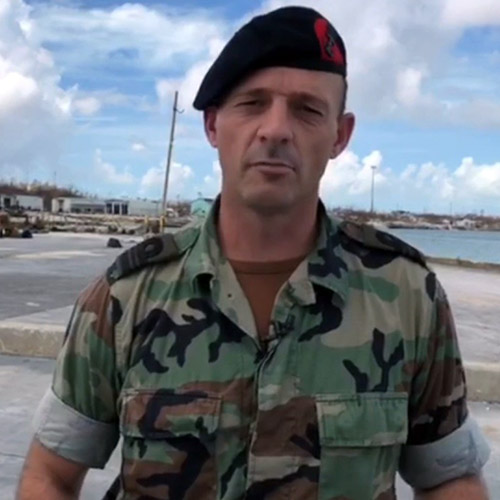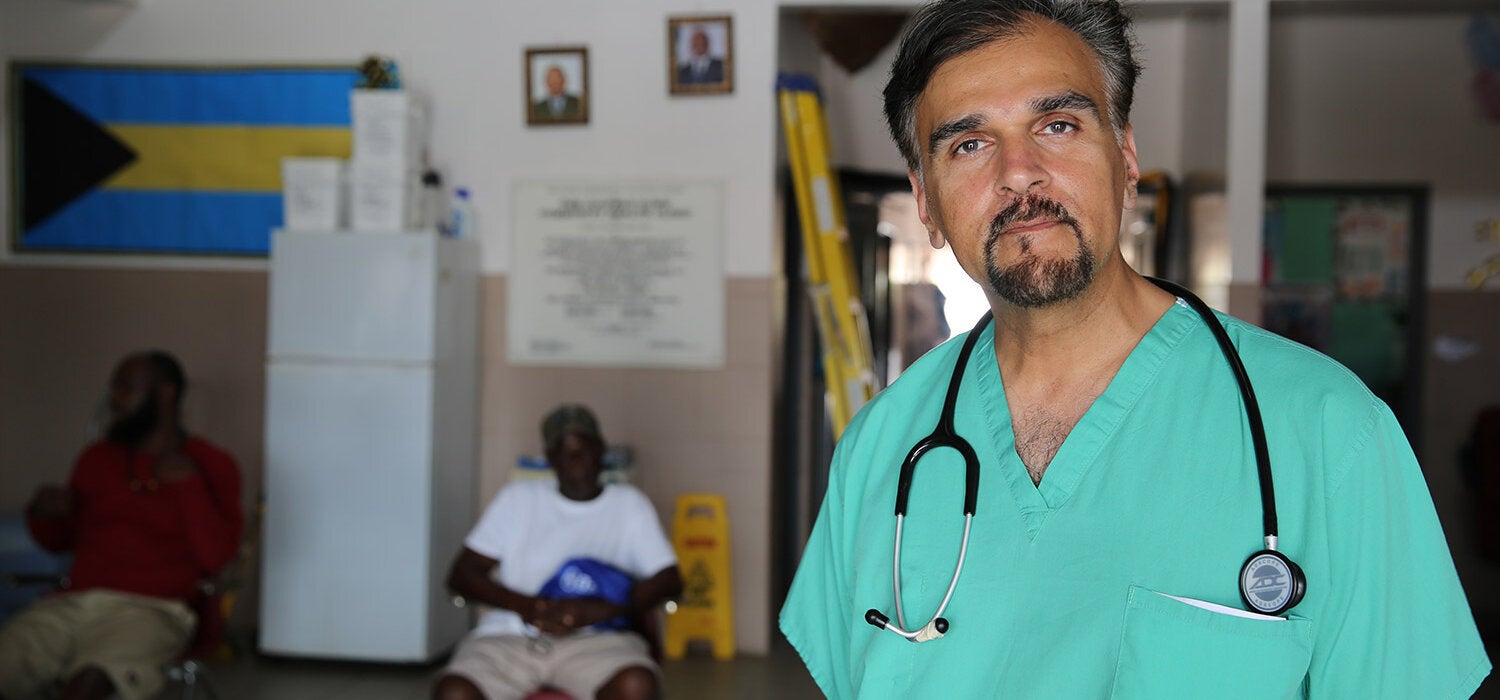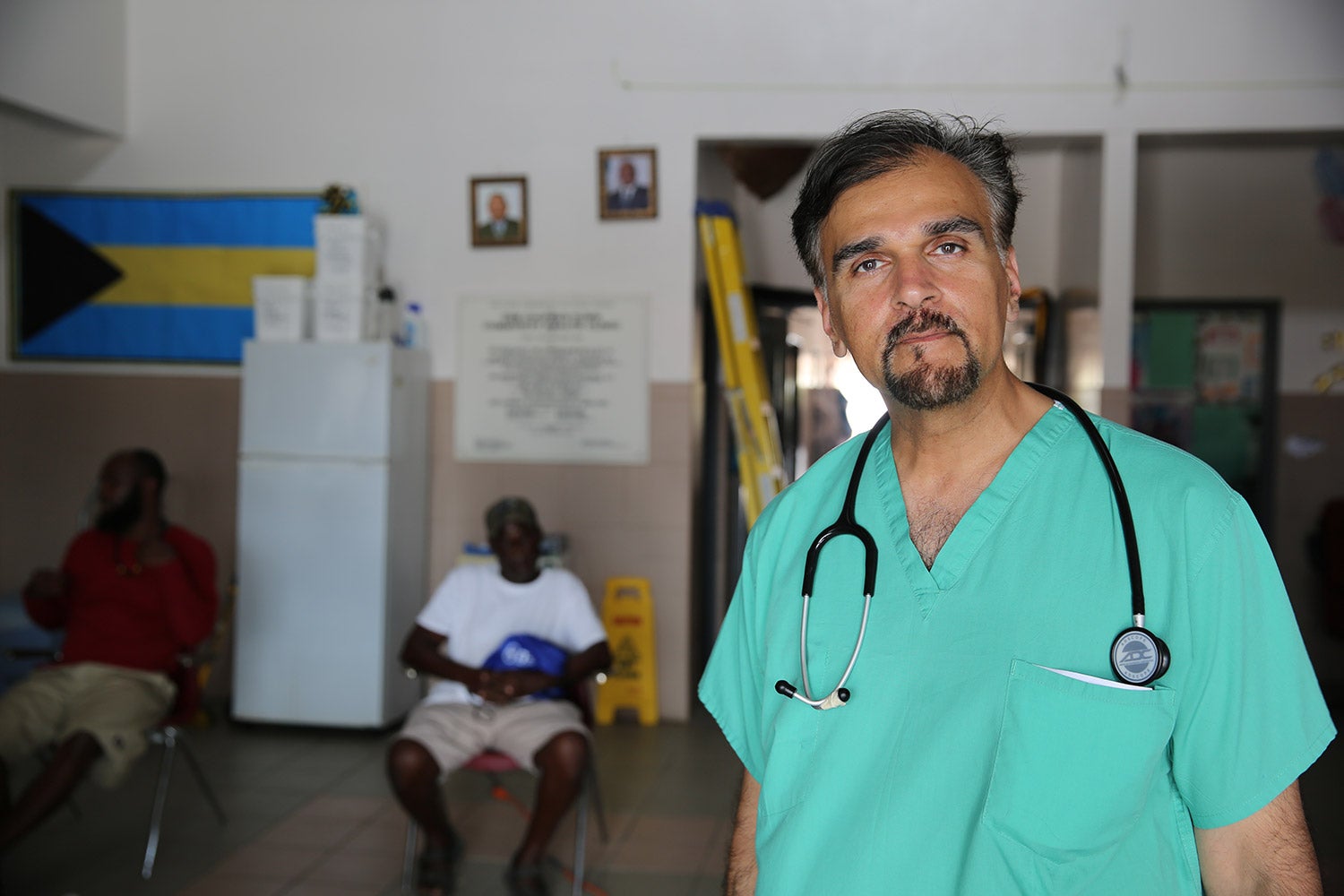Washington D.C., 17 September 2019 (PAHO/WHO) - The Pan American Health Organization (PAHO), alongside the Ministry of Health in the Bahamas, is coordinating disaster-relief efforts by partners and agencies from all over the world to help the people of the Bahamas access the care they need.
We heard from some of the people involved:
Dr. Kaleem Malik - The Medical Doctor
“When we arrived in Coopers Town [Abaco], we found this clinic to be absolutely destroyed – the patient rooms, the lobbies, the wards. The ceilings were down, insulation was down, water damage. The smell was unbearable,” said Dr. Kaleem Malik, Medical Lead for Humanity First disaster response.
Dr. Malik is one of 12 people from the USA and Canada sent by Humanity First to support the Bahamas in ensuring medical care to the population affected by Hurricane Dorian. Humanity First is one of the seven Emergency Medical Teams (EMTs) deployed to Abaco and Grand Bahama Islands. This is coordinated by the Ministry of Health and PAHO/WHO to ensure that partners are sent to where they are needed the most and have all the equipment they require to operate.
“The local nurse here had done a tremendous job but was absolutely exhausted. We have no power, no electricity, no running water, no Wi-Fi… But we immediately began looking at how to rebuild and make this clinic functional again.”
Since the hurricane, Dr. Malik and the team from Humanity First, as well as local clinic staff, have worked around the clock to create a sterile field so that the Coopers Town clinic can continue to receive patients – from 15 to over 20 per day.
“We have some critical patients. We had to evacuate a patient earlier today. When he came in, his blood pressure and vitals were very unstable, but fortunately, the coastguard were here within an hour and a half and airlifted him to Nassau,” said Dr. Malik last week. “Mostly, we are seeing minor wounds, acute exacerbations of chronic illnesses, which we are able to manage with medication.” Dr. Malik also noted that there has been an increase in upper respiratory infections, and a lot of skin infections and dermatitis due to people touching the debris outside.
“I was supposed to leave this morning, but it is impossible for me to go,” said Dr. Malik. “They have adopted us here, taken us in like a family and we have come to know one another. As well as working with the local staff, even the neighbors are coming to help and support us with what we need. It has been a very touching experience.”
Major Denis Borst - The Dutch military forces
“We were already in the Caribbean on training in St. Maarten when we received a call from the Prime Minister of the Bahamas to request support, so a decision was made to support the Bahamas, provide aid and send us in this direction,” said Major Denis Borst, from the Dutch military forces.

The military forces are working with PAHO and the Ministry of Health as part of an emergency coordination center, where all international organizations, non-government organizations, and government organizations of the Bahamas sit together to coordinate emergency response.
“We’ve got engineer capability, including heavy vehicles which are able to clear debris from critical infrastructure, as well as medical expertise to help the local government provide medical support to the local population,” he added.
The Dutch ship, which has brought Dutch, French and German troops to the Bahamas to assist with post-disaster relief, also has helicopters and landing craft to help with efforts.
“The local medical facility (in Marsh Harbour) had some issues with people that weren’t able to get the medical attention they needed, so our helicopters were able to transport them by air to another medical facility, which was good,” said Major Borst.
On Thursday last week, the Dutch military, in coordination with PAHO and the Bahamian Ministry of Health, evacuated an 8-month pregnant woman who needed specialist medical care. The Dutch military is also working to repair damage to infrastructure in clinics and have erected two tents in Marsh Harbour Port, which are being used as a logistics center for the World Food Programme.
See the video here
Charlie - The rescue dog
Government partners in Hurricane Dorian disaster relief also include the four-legged variety.

Charlie is part of a 13-person team of firefighters and volunteers from British Colombia, Canada, that have been based at the Marsh Harbour Healthcare Centre since the Saturday after the hurricane.
Charlie is one of four dogs that has been helping with search and rescue efforts in Abaco – primarily focused on finding people that may be injured under the rubble. While carrying out his job, Charlie sustained a slight injury to one of his paws, that has been treated. Despite his injury, Charlie was very keen to get back to rescue efforts as soon as possible and is now back to working at full capacity.
While he declined to comment for this article, Charlie’s team confirmed that he is indeed a very good boy.
PAHO/WHO has established a special Bahamas Health Relief Fund to receive unrestricted and unearmarked funds from donors who would like to support the Ministry of Health of the Bahamas in its relief and response efforts related to Hurricane Dorian. For more details on how to donate, visit here.


